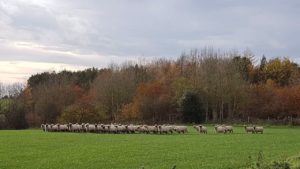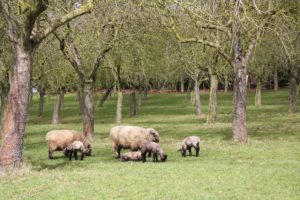Whether you have kept sheep before or are a newcomer to sheep, you’ll find Shropshires are a pleasure to own and are worthy of their long heritage and successful history. You’ll find more information across our website, but here we give a few pointers to things that you might be wondering or asking.
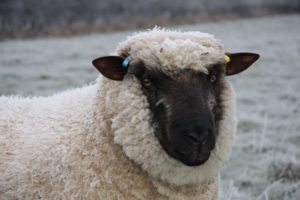
I’d like to see some Shropshires before I commit and where can I buy them? –
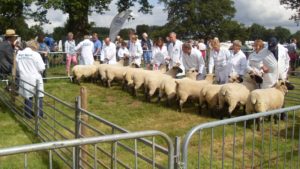
There are a few ways to see Shropshire sheep before you decide to go ahead, or ways to purchase your Shropshires
Agricultural shows – Shropshires can be found at agricultural shows throughout the UK, and where there is no class for Shropshires you may find them in a mixed class with other lowland breeds. At every pen of Shropshire sheep there will be an enthusiastic breeder who will be pleased to hear of your interest and will help you in any way they can.
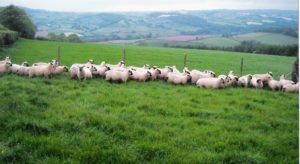
Local breeders – Breeders in your area can also be found through the SSBA membership website page . This allows you to see Shropshires in their “working clothes”. You will learn far more in an hour or two on the farm that you can at a show or auction sale. Many breeders will have stock available for sale or will know of other local breeders who can help you source stock if they have none available. Many breeders will be very happy to show you their flock if you contact them and make an appointment.
National Show & Sales – You could visit the annual Show and Sale at Shrewsbury (in July or August each year) or other sales. The dates of SSBA sponsored sales are posted on the website nearer the time.
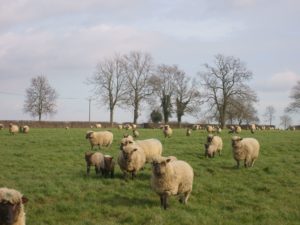
Sell My Livestock – The SSBA recommends members to use the Sell My Livestock website to sell their stock. On Sell My Livestock registered breeders, who are members of the SSBA, can list their stock on the Shropshire Sheep Portal – click here to go to it. We also have a Sheep for Sale page on this website – click here – that lists Shropshires currently on the portal. As all Shropshires on the Sell My Livestock portal or this website are from members of the SSBA, they should have all their registrations and paperwork in order. On Sell My Livestock look out for the SSBA logo and “Shropshire Society” printed across the thumbnail photo. But the SSBA do recommend that buyers take care to make sure that any Shropshires that you see on the Sell My Livestock site (or that you see advertised in other places) are properly registered pedigree Shropshires. Always make sure to see the sheeps’ registration paperwork before you commit. Under SSBA rules, all sheep must be birth notified by the breeder within 90 days of birth. Thereafter, any female over four months old must be pedigree registered by the breeder before it can be sold. Male sheep can be registered by the breeder or a new owner (if a member of the SSBA). If you are in any doubt about the status of any sheep for sale, please contact the SSBA’s Registrar through the link on this site.
Health Status and other factors in buying sheep –
There are various health categories for Shropshire sheep (as there are for nearly all pedigree sheep in the UK). Some breeders are members of the MV Accreditation scheme, which ensures that their sheep are free from the Maedi-Visna sheep disease. Some breeders are members of the Scrapie Monitoring Scheme, that certifies that sheep on their holding have been scrapie free for a set number of years. Finally, some breeders are members of the Shropshire Breed Improvement Scheme where breeders measure key productivity and production statistics of their flock. You’ll find more details of each of these schemes on the relevant page of this site if you want to know more details. There is no compulsion to have sheep from any of these categories, it is for you to decide.
MV page;
Scrapie page;
Breed Improvement Scheme page.
Choosing your Shropshire Sheep and Managing your flock –
The SSBA has booklets and information to help you get started.
- See this guide for what to look for in buying a Shropshire Sheep using the SSBA’s conformation guide – Critical Selection Booklet and see The Purchasers Guide for a summary of what to look for;
- See the guide Getting Started with Shropshire Sheep for an introduction to the Society and its rules and requirements to help you run your pedigree flock and and keep everything up to date.
- The SSBA also has a handy two page quick reference guide – Your Pedigree Year – to help you with all the key tasks to keep your flock pedigree status and SSBA membership up to date. See here.
Finally, don’t forget to become a member of the Shropshire Sheep Breeders Association. Download the Membership Form via the link on our new members page.
As a member of the SSBA you will receive the annual Flock Book, our newsletters, eligibility for the Society Show and Sale, support and advice whenever you need it and importantly you have to be an SSBA member to register sheep as pedigree Shropshire Sheep.
Our Membership Secretary (membershipsec@shropshire-sheep.co.uk) will be able to answer your questions about becoming a member and will also be available to guide you through your first year as a member, getting used to the requirements of keeping pedigree sheep.
Enjoying your Shropshires –
If you already keep sheep or have kept sheep before you will find Shropshires to be a pleasure. They will thrive on ordinary pasture (such as in old orchards) and should require little supplementary feeding. An easy mistake would be to over-feed and find your sheep getting fat when you really want them to be fit.
As with other breeds, lambing in mid-winter calls for a careful programme of feeding but in the Spring, with new grass, very little is needed. You will find Shropshires to be easy lambers needing minimal intervention. On improved grassland Shropshires are capable of high growth rates and produce excellent fat lambs
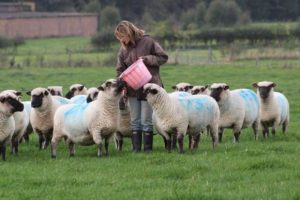
For newcomers to sheep Shropshires are an ideal breed. You will find a small flock easy to tame and your sheep will soon learn to come to a bucket – just don’t give them too much! Ideally your pasture can be divided into paddocks – electric fencing works – so that you can rotate your grazing, which will improve both productivity and health. You may have friends or neighbours who can offer guidance but our Membership Secretary is also there to answer questions and point you in the right direction.
Get to know your local sheep vet. Your vet will always be there in a crisis, but they will work with you throughout the year to help you maintain and improve flock health. They will also run training events around many areas, like lambing and parasite control.
Healthy sheep create less work, are more productive, and ensure that keeping sheep is a pleasure
There are plenty of good reference books out there, but you could do well with The Sheep Book for Smallholders by Tim Tyne.

